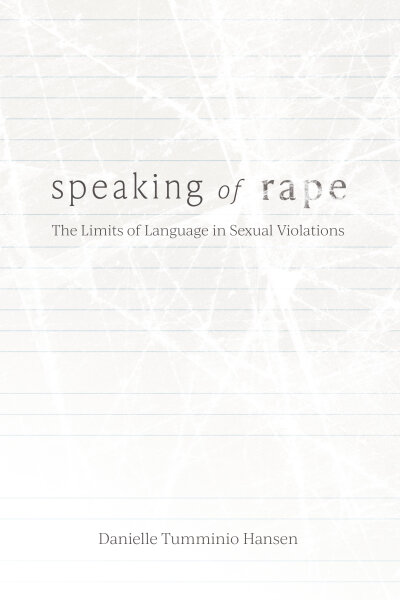This book is a courageous and extremely insightful analysis of narrative agency in the aftermath of sexual violation. It is written with the author's whole self, bringing to the vexed subject of rape the lived experience of a survivor, the political consciousness of a feminist, and the profound compassion of a practical theologian.
Rape survivors need speech to recover--to tell the story of their harm, to rebuild their sense of self and their place in the world. But the words available to them often fail to describe their experience of the violation, which isolates and silences them, enables future perpetration, and lets rape remain unacknowledged.
Tumminio Hansen steps into this space of the seemingly unspeakable and responds to the linguistic crisis by offering fresh ways of speaking and listening that reframe how we can describe, discuss, and address rape. Bravely weaving first-person narrative with the wisdom of psychologists, philosophers, theologians, and restorative justice experts, Speaking of Rape revolutionizes our ways of understanding the scope and nature of sexual violations in order to revolutionize how we respond to them.
- Publisher Fortress Press
- Format Hardcover
- ISBN 9798889831327
- eBook ISBN 9798889831334
- Dimensions 6.25 x 9.25
- Pages 286
- Publication Date March 19, 2024
Endorsements
Susan J. Brison, author of Aftermath: Violence and the Remaking of a Self
Piercingly analytical and honest, Speaking of Rape situates the author's own experiences in the context of a sustained scholarly commentary on how we do things with words about sexual violations. Danielle Tumminio Hansen lays bare the complexity of naming rape and proposes pathways to reconstructing the self in the aftermath. The book is interdisciplinary, insisting that feminist philosophy and pastoral theology both be part of the conversation about sexual harm. Anyone from any background who reads this book will receive a rare gift: an invitation to remember and speak their own bodily truth. There is no prevention for rape. But after rape there is: Voice. Voice. Voice.
Margaret D. Kamitsuka, Francis W. and Lydia L. Davis Professor Emeritus of Religion, Oberlin College
In this powerfully argued and beautifully written book, Danielle Tumminio Hansen highlights a conundrum that all survivors of sexual misconduct face--how to find the words to speak the unspeakable, to come up with the exact, right phrasing to convince others to believe something that is already in doubt, and within a society that is constantly changing the relevant terms and definitions. Through the lens of linguistics, story, narrative, and even notions of plot, Hansen does what her book title so boldly claims--she speaks of rape in order to point us to the ongoing paradoxes in which victim-survivors continually find themselves as they try to process what they've lived, and find the right words to tell their stories. Tumminio Hansen emerges as an important new voice on this subject and her argument, an essential contribution to scholarly conversation about sexual misconduct and, yes, rape--one we must all be willing to hear.
Donna Freitas, author of Consent: A Memoir of Unwanted Attention and Sex and the Soul: Juggling Sexuality, Spirituality, Romance, and Religion on America's College Campuses
In this authentic, unflinching, and beautifully written book, Danielle Tumminio Hansen tells us something deeply important about sexual harm. The words we use to describe it often cause more harm, fail to capture its depth, and obfuscate rather than empower; that law, religion, popular culture, and the media are all too often complicit. But this book is not just critique. Tumminio Hansen offers a path forward that includes storytelling and active, deep listening; she envisions a restorative justice approach that provides both accountability and healing for individuals and communities.
David R. Karp, director, Center for Restorative Justice, University of San Diego
